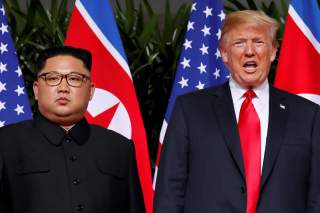Ending the Korean War Is in the National Interest
A peace treaty will do more to change Pyongyang's behavior than a return to a cycle of escalation.
Transforming the peninsula would be advantageous even if the North did not fully disarm. Possession of nuclear weapons is less important than the motivation to use them. That is, no one spends a lot of time worrying about France, Israel, or the United Kingdom using their nuclear weapons. Most nations, including the United States, do not fear India or Pakistan launching an attack on them (with good reason, though, these two powers worry about each other).
Kim’s willingness to denuclearize may be in doubt, but his newly demonstrated desire to participate internationally is not. He may well want “peace and prosperity,” as the summit statement put it. Creating “a peace regime” might help normalize the North’s behavior even if it does not result in disarmament.
By meeting Kim, the president created new opportunities to encourage stability and peace in Northeast Asia. Despite the uncertainties and risks, he should press forward, which means building the sort of relationship and treaty that might help bring North Korea in from the cold.
Doug Bandow is a senior fellow at the Cato Institute. A former Special Assistant to President Ronald Reagan, he is the author of Tripwire: Korea and U.S. Foreign Policy in a Changed World and co-author of The Korean Conundrum: America's Troubled Relations with North and South Korea.

